Maestro: Bradley Cooper & Carey Mulligan Compose Music For The Eyes
This is #CineFile, where our critic Rahul Desai goes beyond the obvious takes, to dissect movies and shows that are in the news.
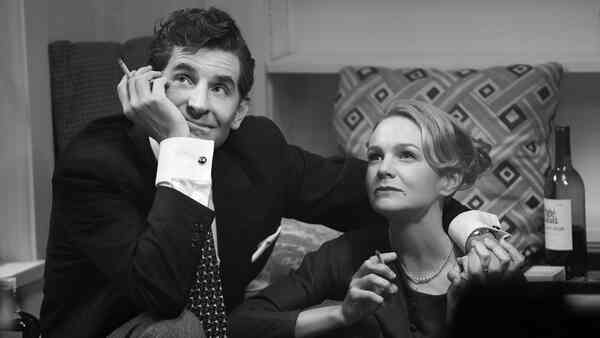
Last Updated: 12.02 PM, Dec 21, 2023
This column was originally published as part of our newsletter The Daily Show on December 21, 2023. Subscribe here. (We're awesome about not spamming your inbox!)
***
THE first hour of Maestro unfolds like a black-and-white Broadway musical in 1940s New York. An upcoming composer meets an upcoming actress at a party. They hit it off. They have sparkling chemistry. They have stimulating conversations. They inspire each other to success and fame. They marry. They have kids. They become an American power couple. The camerawork and score are sweeping, the transitions are playful, the romance is cinematic. The film-making flaunts and flexes, winks and twirls. There’s a bit of Damien Chazelle about its breathless ambition. It is indeed like watching the alt-reality montage of La La Land — except it’s not about “what if?” so much as “what next?” It’s not the end of something, but the beginning of everything.
The rest of Maestro unfolds like an alt-fiction film. The historical drama centered on the relationship between Leonard Bernstein (Bradley Cooper) and wife Felicia Montealegre (Carey Mulligan) is anything but predictable. It is jumpy and it is abrupt; it is surprising and it is tender. The film manifests the gist of its opening quote (by Bernstein himself): “A work of art does not answer questions, it provokes them; and its essential meaning is in the tension between the contradictory answers”. The marriage in focus triggers many questions, and the answers are always complex. The black-and-white phase closes with a foreboding shot of Felicia quite literally at the ‘heart’ of Leonard’s legacy — his shadow slowly looms over her during a performance, until she occupies a space at the chest of that shadow. Her identity is consumed by his. Her being is swallowed by his.
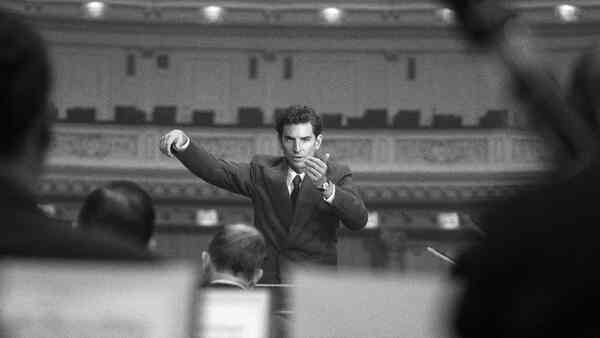
The next hour is fascinating for how it challenges our perception of toxic-artist biopics. When Leonard refuses to change his Jewish surname at the peak of World War II, we expect his sociocultural struggle — his homosexuality, his religion, his traumatic childhood — to define the story. But Maestro has no time for scale and width; we only see Leonard Bernstein through the eyes of his wife. The aura and legend are stripped away; what remains is a self-absorbed musician and an actress who can’t pretend anymore. When Felicia gets bitter about raising a family while her husband wows the world and has affairs, we expect it to go the Bohemian Rhapsody way: Maybe they might separate and stay platonic friends. But the two never let go of each other as conflicted companions — and Leonard never truly embraces his sexual orientation. When Felicia does decide to leave the cage, we expect it to go the Priscilla way: Maybe she never looks back, and his substance abuse gets pronounced. But Felicia falls back in thrall to — and back in love with — a decaying Leonard.
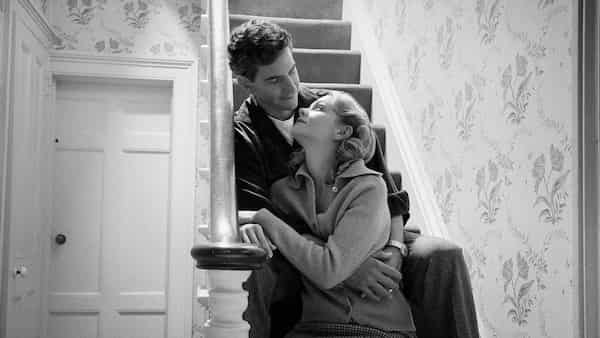
When they reunite after years of resentment, we expect a final flourish of joy and genius. But Felicia is diagnosed with cancer; all that lost time cannot be made up anymore. When she passes away, we expect it to become a portrait of grief and sobriety. But one of the final moments shows an old and sweaty Leonard dancing with a young student at a nightclub — he misses her, but his heart hasn’t stopped. In a way, their togetherness plays out like an alt-reality narrative of his namesake, Leonard Cohen, had Cohen perhaps married his soulmate Marianne. Seeking is, after all, the cornerstone of great art.
Maestro is driven by powerful performances. Bradley Cooper swings for the fences in his depiction of Leonard Bernstein, as someone who loves people too much to be boxed by any single label. It’s a turn that’s rooted in a greed to live and feel. He wants everything and everyone, and his versatility across the music spectrum (scoring for films and Broadway shows, composing and conducting) emphasises that greed. The actor does wonders with his gait and voice — as he did in A Star Is Born — and stays, almost tantalisingly, on the brink of doing too much. The star of Maestro, though, is Carey Mulligan as Felicia. She is somehow both strong and weak, hopeful and cynical, happy and sad, sensual and spiteful. She gives momentum to the film’s sense of heartbreak and womanhood, turning tragedy into more of a transient emotion. Even the way Felicia holds her cigarette and smokes feels like something she does to co-inhabit Leonard’s world — and, by extension, abandon her own.
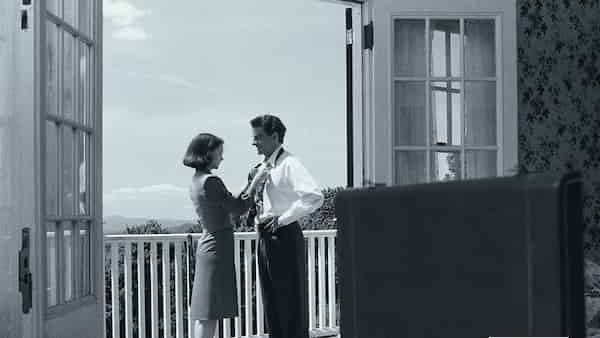
Maestro plays around with motifs, visual and narrative. For instance, Felicia spends the black-and-white portions watching Leonard perform. She watches him a lot. She watches from backstage, interpreting her admiration for him as love. The camera lingers on her face, as if it’s a screen that projects his brilliance. The camera lingers behind her shoulder as he keeps flitting in and out of her space — performing, waving at her, running to her and kissing her, but always rushing back out. She watches him in interviews, at home, at the park, in bed, and convinces herself that he needs to be watched. Once colour invades their life, this motif of watching morphs into seeing (through) him. She watches him kiss a man in their house; she watches him flirt with his protege after a rehearsal; she watches him holding someone else’s hand when he gets emotional.
It’s to Cooper’s credit as a film-maker that this comes full circle during the best scene of the film. In one long and unbroken take, the camera shows Leonard conducting the hell out of Mahler’s Resurrection Symphony at a cathedral. It stays on him throughout the famous performance, tracking in and out — only coming to rest behind a familiar shoulder. It’s Felicia, and she’s watching him like she used to. This is how they reunite: Her awe returns. She isn’t supposed to be there. But her gaze never left.
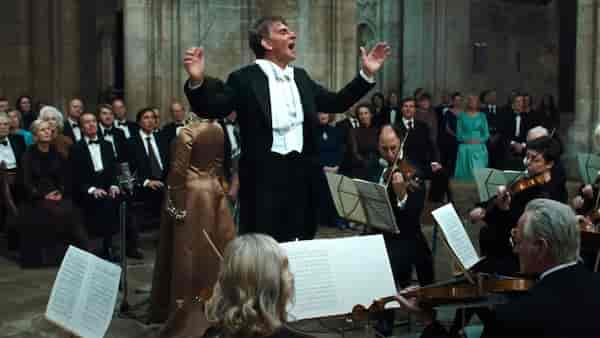
Most of all, Leonard Bernstein’s dual image as a composer and a conductor — a creator and a medium — shapes the DNA of this film. It starts with Cooper himself not only directing the film but also starring in it. The film, too, adapts history while delivering an original vision of it. Then there’s the marriage dynamic: Felicia is the conductor of the burgeoning family even as Leonard composes their privileges. There’s Leonard’s role in Felicia’s life: He creates a home with her only to conduct his business elsewhere. There’s Leonard’s identity crisis: He seems to be conducting a different personality from the one he grew up composing.
And finally, there’s the very act of conducting. As a viewer, the relationship between a virtuoso conductor and an orchestra mirrors the relationship between light and sound. There’s a poetic lag between action and effect: The music emerges a few milliseconds after the dramatic swish of a baton. The eyes prepare the ears. The silence precedes the symphony. The conductor’s motion is not an optical manifestation of the notes that follow; it’s a sensory cue of the notes that exist. Maestro, as a film, is a similar experience. When two artists fall in love, it takes time for the consequences of this love to reach them. When a heart breaks, it takes time for the body to revolt. When a person fades, it takes time for the grief to kick in. When a life ends, it takes time for the memories to emerge. And when a question is provoked, it takes time for the answers to seek each other.

 Premium
Premium